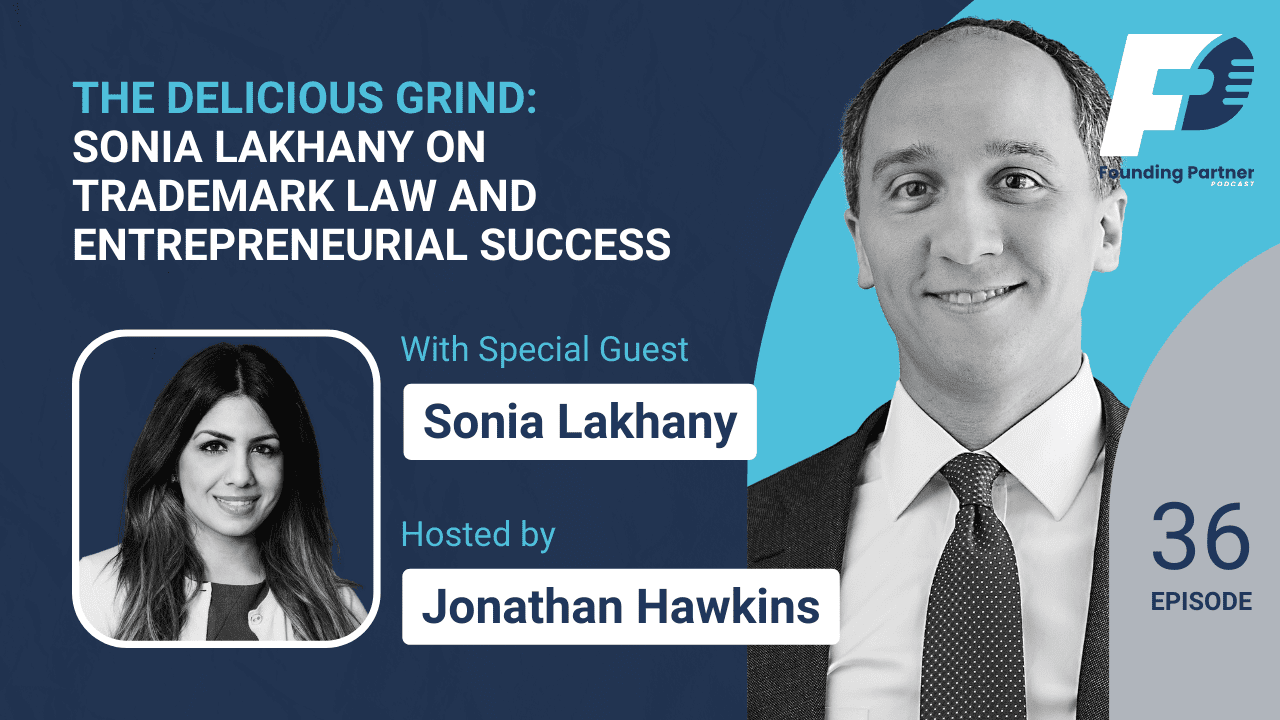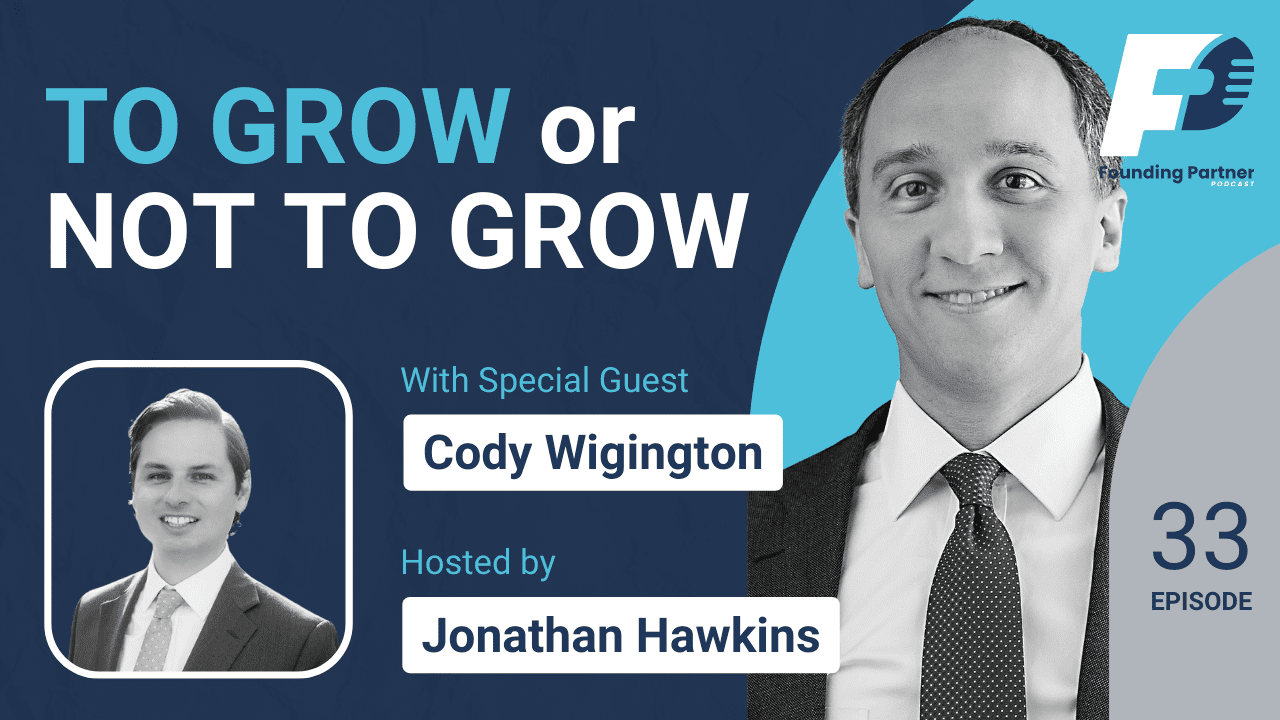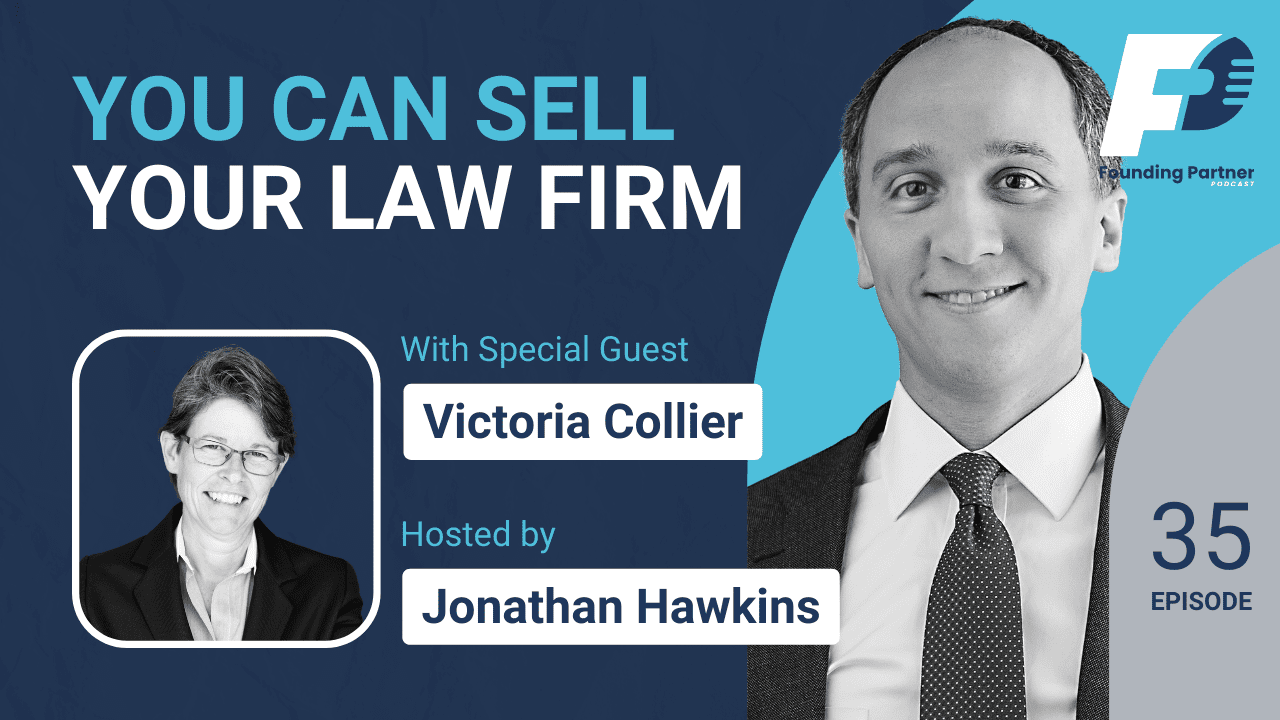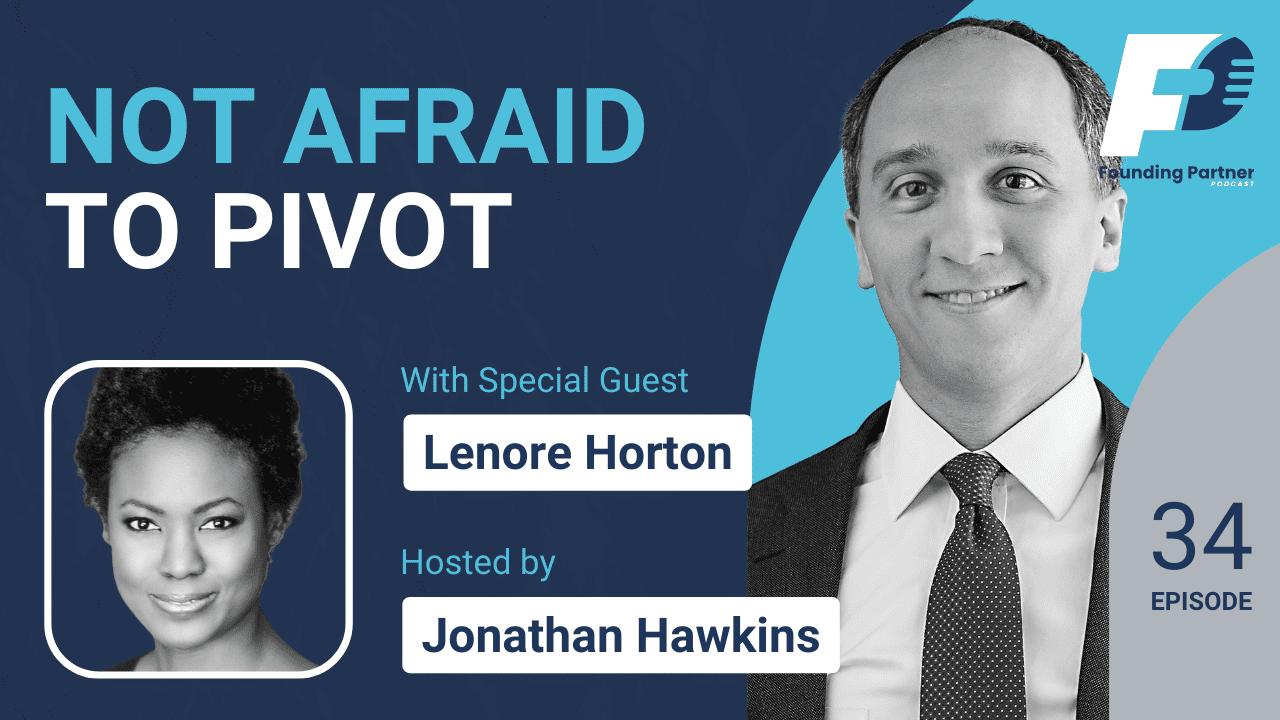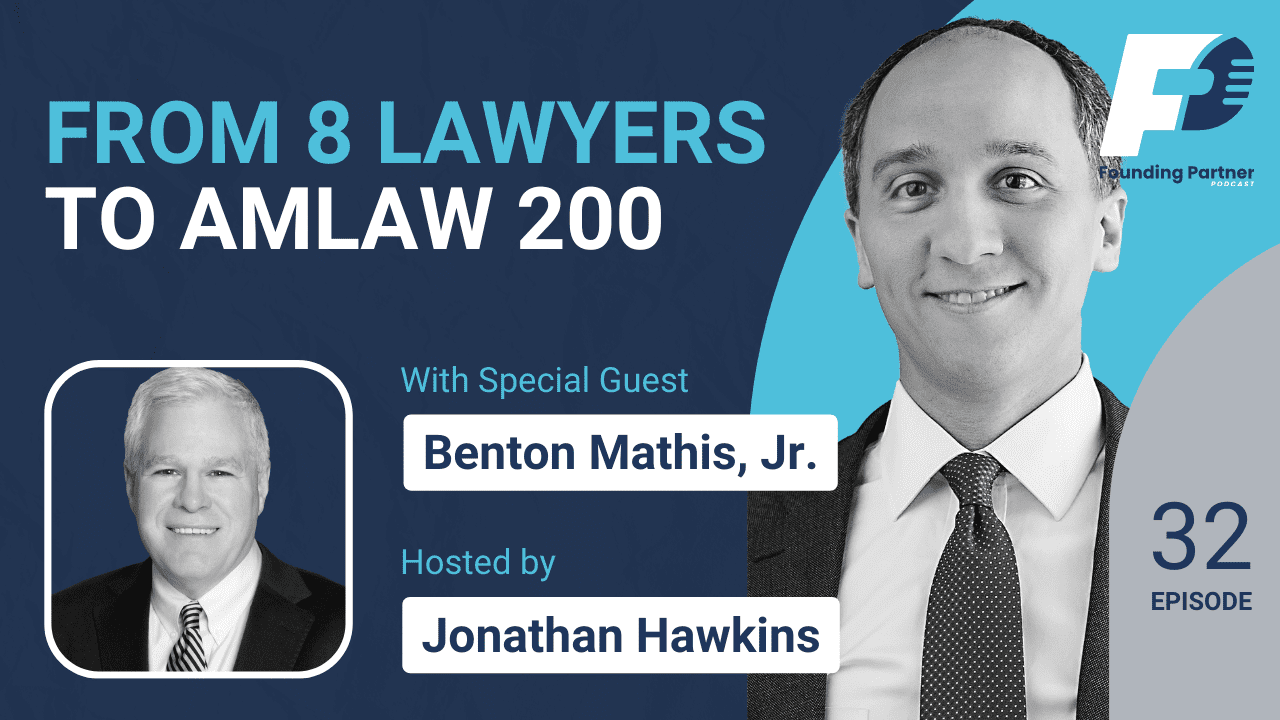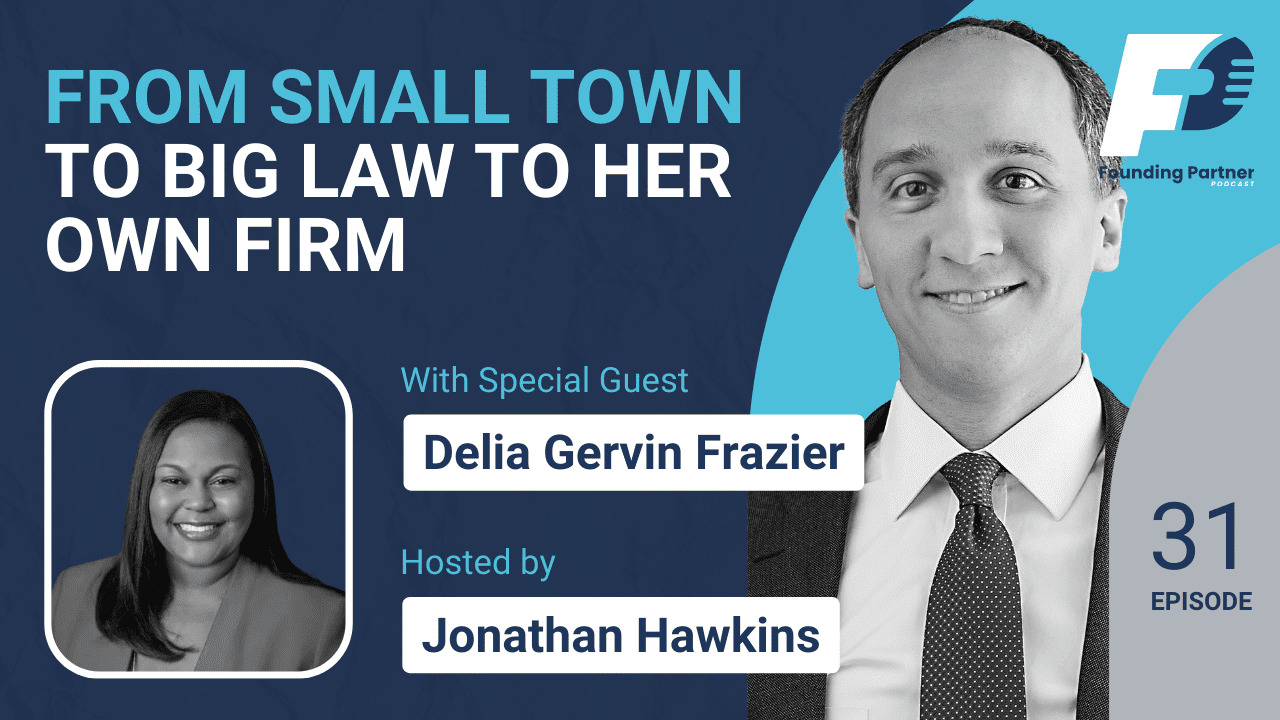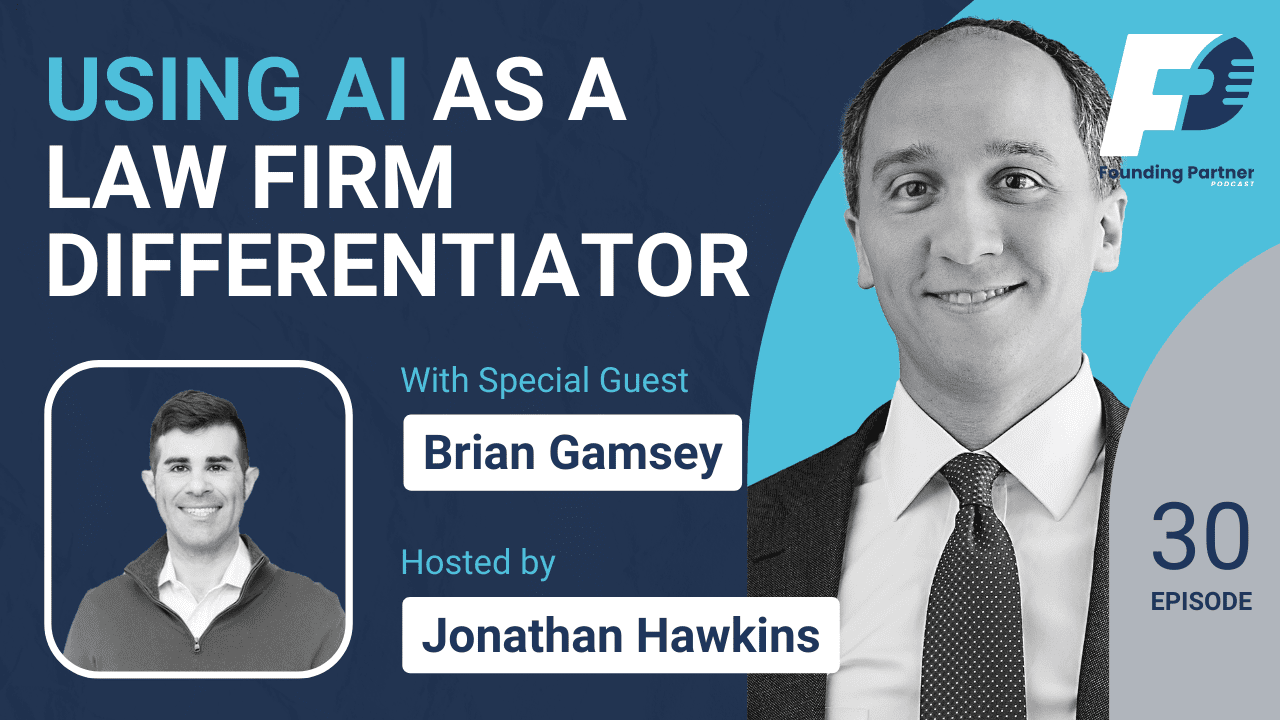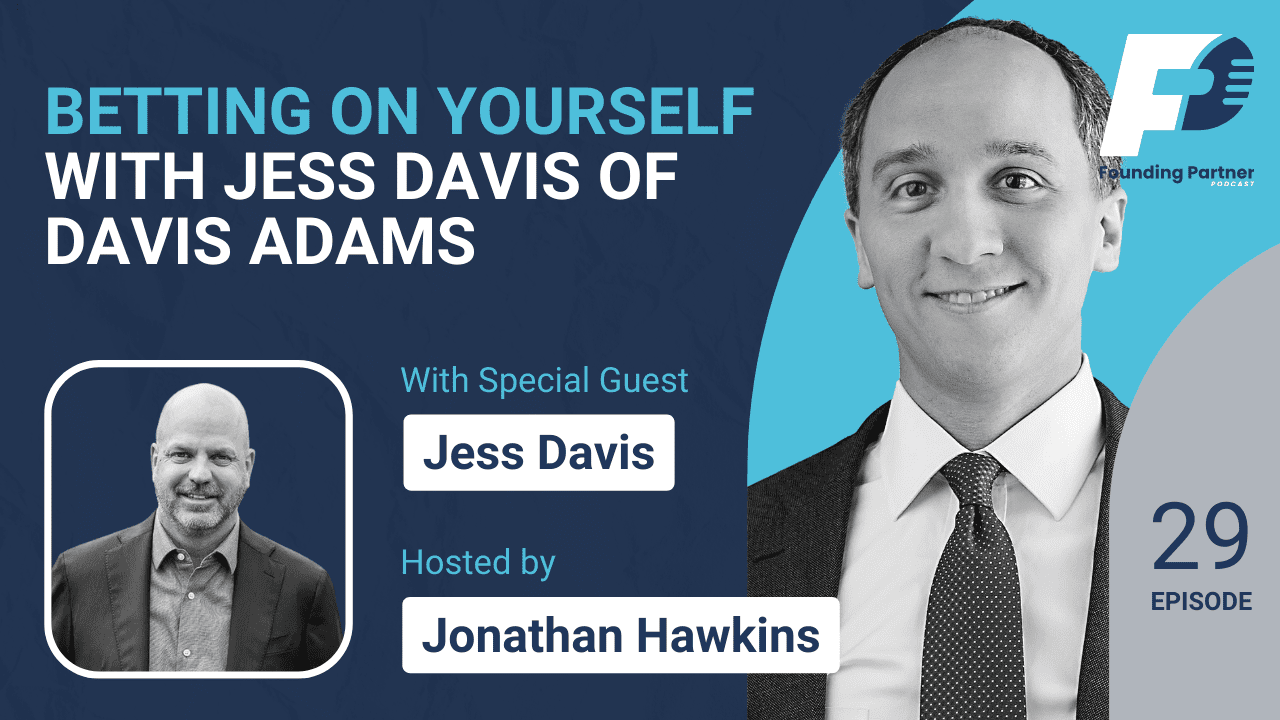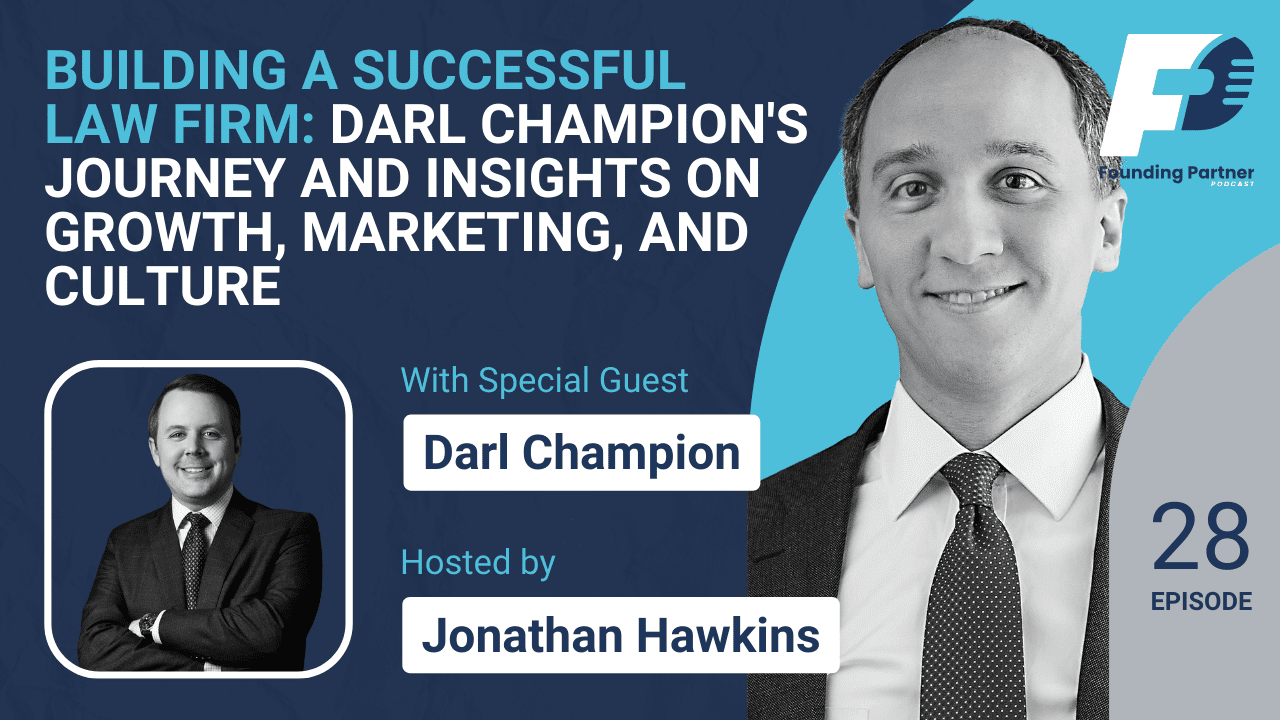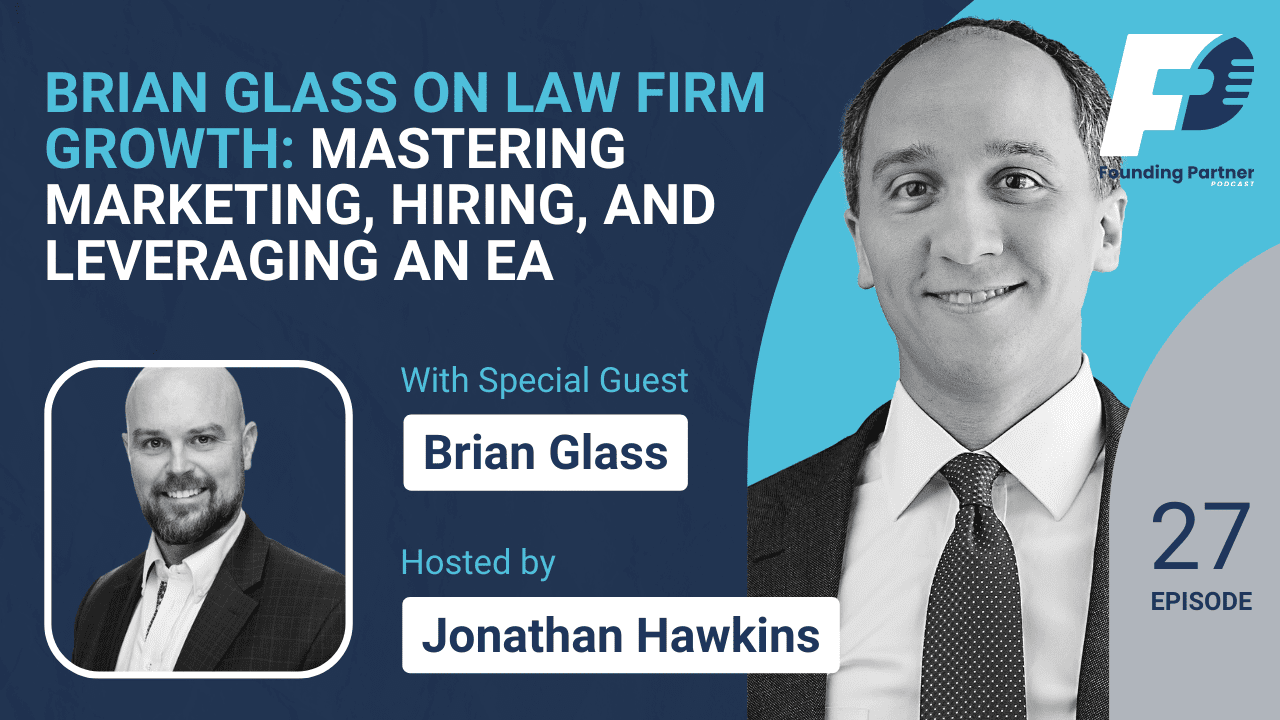[00:00:00] Cody Wigington: I was lucky enough to work at firms where they had people who did. I mean, the 1st firm I worked with the I’ll call them the older lawyers there. You know, they were trying cases in the 80s and told stories of trying, you know, 4 cases in a week. You know, several of them had over 100 trials.
[00:00:15] Cody Wigington: And so I was really blessed to grow up under them and learn from them. And they tried cases even when I was there. I mean, I got to try cases there. And then same thing with the firm that I was most recently with those leaders. They’ve tried cases. It was amazing. Now that’s not to say I wasn’t on teams where we would be on calls and it would come up that maybe I was the only one that had tried a case on that particular team.
[00:00:35] Cody Wigington: But the ones I worked with every day. Very much trial lawyers
[00:00:39] [00:01:00]
[00:01:08] Jonathan Hawkins: Welcome to founding partner podcast. I’m your host, Jonathan Hawkins. We’ve got an interesting guest today. He’s a business litigator, former big firm lawyer who’s decided some years ago he wanted to go out and start a litigation boutique. And we’re going to get into the meat of all that. What’s the difference between big law and your own firm and all that.
[00:01:32] Jonathan Hawkins: So welcome to the show, Cody Wiginton. Cody why don’t you tell us about your firm, where you are, what kind of work you do, maybe give us sort of your current staffing type structure. And yeah, tell us.
[00:01:47] Cody Wigington: Absolutely. First, thanks for having me on Jonathan. I appreciate it. I’m already a listener of the podcast.
[00:01:52] Cody Wigington: That’s fun to be on. But yeah, Cody Wigington, I own a self named law firm, Wigington Law LLC and I did that [00:02:00] despite good advice when I first started to use a trade name from our host here but I’m a trial lawyer, so I couldn’t help myself, and I named the firm after myself. We’re a commercial litigation boutique.
[00:02:10] Cody Wigington: We focus on Representing businesses and professionals when they get in disputes and when those disputes need to be litigated or ultimately tried to a judge or jury. It’s what we do, we’re narrowly focused on that. The substantive areas vary a little bit from, your typical core business litigation to employment, professional liability, and sometimes regulatory enforcement defense proceedings.
[00:02:31] Cody Wigington: But singularly focused on what we consider commercial litigation. Right now we’ve got me, two council level attorneys part time paralegal, and a special counsel.
[00:02:42] Jonathan Hawkins: I’ve talked to a number of lawyers on this podcast and just, generally that our former big firm lawyers that have started their own firm, my sense is, most, big law, you’re you’re either a lifer or not.
[00:02:54] Jonathan Hawkins: Now, there are those that think they’re lifers and then all of a sudden the firm tells them, no, you’re not. And then they’re [00:03:00] scrambling. But you, at some point, decided you wanted to leave the big firm life. And so how, first of all, how long had you been at big law and what, what caused you to say, you know what, I think I want to try something else.
[00:03:13] Cody Wigington: Yeah. So I was in big law for a little bit shy of 10 years and I intended to be a lifer. I joined a big firm. I loved the big firm that I started with. My intent was to become partner at that firm and be there for my entire career. So just over the years, a couple of things happened. One, I started to develop my own business and two, I encountered these things called litigation boutiques.
[00:03:36] Cody Wigington: And I didn’t come from a family of lawyers. I didn’t know what the different law firms were in the markets. And so I didn’t know what a litigation boutique was at the time, but, running across them, they seem to be representing some of the same clients that the big firms are representing, but they seem to be getting cases to trial.
[00:03:52] Cody Wigington: They seem to be getting headlines. They seem to be, doing things that. You wouldn’t typically think of in terms of big firms and [00:04:00] representing big companies and litigation. And that obviously intrigued me. As a senior associate, I got a chance to work alongside of 1 of. The better known more storied litigation boutiques in another area of the country, and it was impressive to watch their coordination, the way they work together and just their strategy.
[00:04:18] Cody Wigington: It was definitely not looking at settlement. They were like, how are we going to present this big case of trial? And what’s it going to look like? And that was just. Intriguing to me altogether, and that’s not to say that the big firm teams I worked with didn’t do similar things. Big firm teams.
[00:04:32] Cody Wigington: I worked with were really impressive, but there was just an overall coordination and difference with these litigation boutiques. I’m, as I’m getting older, I got my own business. I’m looking around Atlanta, and there’s some good litigation boutiques around Atlanta to fit this mold. I’m not going to mention any names because I’m afraid I might leave somebody off, but there’s definitely several.
[00:04:50] Cody Wigington: But I thought there was room for more, and so I just finally got to a place where I said, let me see if I can build one.
[00:04:55] Jonathan Hawkins: So did you always know you want to be a trial lawyer or is that something that, that sort of. [00:05:00] Came about, and I ask it’s funny. I myself as an example, I went to law school and in law school, I wanted to be a trial lawyer.
[00:05:08] Jonathan Hawkins: That’s what I wanted to do. My dad was a lawyer and we had talked about it and that’s what I want to do. And I did that for a while do less of that now, really not much at all, but and then there’s so my path was, I wanted to be 1 and then eventually moved out of that.
[00:05:22] Jonathan Hawkins: What about you?
[00:05:24] Cody Wigington: Oh, yeah. The only reason I went to law school to try cases and litigate cases. If I had to be a deal lawyer, I wouldn’t be a lawyer at all. I go do sales or something else. I wanted to be a trial lawyer, wanted to be a litigator. And that’s what I went to law school to do.
[00:05:39] Jonathan Hawkins: And there are big law firm, big firm lawyers that get to try cases, they’ll joke that the partners that the big firms in the litigation group don’t even know where the courthouse is.
[00:05:48] Cody Wigington: I was lucky enough to work at firms where they had people who did. The 1st firm I worked with the I’ll call them the older lawyers there. They were trying cases in the 80s and told stories of trying, 4 cases in a [00:06:00] week. Several of them had over 100 trials.
[00:06:02] Cody Wigington: And so I was really blessed to grow up under them and learn from them. And they tried cases even when I was there. I got to try cases there. And then same thing with the firm that I was most recently with those leaders. They’ve tried cases. It was amazing. Now that’s not to say I wasn’t on teams where we would be on calls and it would come up that maybe I was the only one that had tried a case on that particular team.
[00:06:22] Cody Wigington: But the ones I worked with every day. Very much trial lawyers,
[00:06:26] Jonathan Hawkins: Another thing about big law. It’s tough for a younger lawyer to develop business for a variety of reasons. Number one, you’ve got high rates. They probably have minimum retainers that have to be paid. There’s conflict issues.
[00:06:41] Jonathan Hawkins: There’s all these sorts of things. It’s really hard for a young lawyer coming up to try to develop business. And that’s a skill in and of itself. You got to learn how to do it. And, you don’t go from not knowing how to do it to signing up a fortune 50 company as a client all of a sudden.
[00:06:58] Jonathan Hawkins: So how are you able to [00:07:00] develop business? Did you actively try to do that or did it just happen accidentally?
[00:07:07] Cody Wigington: I’m about to give you an exception to a statement you just made about, you don’t just randomly sign up a fortune 50 company. Because when I was a second year associate, my first land was completely by accident out of nowhere.
[00:07:19] Cody Wigington: I was working with some partner at another office who was fairly recently joined the firm. It was a smaller product in Atlanta. I completed my work pretty quickly, sent it to him and didn’t hear from him. No response to the work product. When I followed up, no response. I think it was like nine months later.
[00:07:36] Cody Wigington: He called me from his cell phone, which at the time was not common to get calls from the partner cell phone. And he told me he’d left the firm like six months ago. That he had a client in Atlanta that needed a little bit of help and that he was just going to refer it to me outright. He said, this person is going to call you and sign, sign you up.
[00:07:53] Cody Wigington: I didn’t bother to ask who the client was. I was just excited. All of a sudden I’m going to be developing business a couple of days went by and this lady called me [00:08:00] and she said, Oh, this lawyer referred me to you and we need help with our, this thing. And being the good associate that I was, I asked for the names for the conflict check.
[00:08:09] Cody Wigington: And when she said the client’s name, which I’m not allowed to say here, it was a massive company. And it was probably all over my voice that I was shocked and excited. And that was not an everyday occurrence for me, but they still signed up. And that was my first ever client got the taste of business development and.
[00:08:28] Cody Wigington: That’s what began my focus on trying to build my book of business.
[00:08:33] Jonathan Hawkins: That’s an awesome story. That’s an awesome story. And I tell you, I’ve always liked it. I think once it’s, like you said, once you get a taste, it’s like you, you’ve gone on a hunt you’ve gotten your first kill, so to speak, and you get addicted, you want more.
[00:08:48] Jonathan Hawkins: So the other thing, the big firm I’ve, we’ve all been through it. I’ve heard lots of stories about you bring in such a client like that, particularly when you’re an associate, you don’t have a whole lot of power and then behind the scenes, [00:09:00] there’s all sorts of maneuverings about who’s origination credit or whatever for that client.
[00:09:06] Jonathan Hawkins: And then some partner comes out of the woodworks and says, I I met with somebody for lunch at that company 10 years ago. And my name’s in there somewhere in the CRM. So I get the credit. Did that? You may not want to talk about it, but did that come up at all when you brought that big client in?
[00:09:24] Cody Wigington: Here’s what I’ll say about that. I had a partner locally that was a mentor of mine and, at the time, and I think most big firms are like this, you have to have a partner on anything and associate brings in. And so he agreed to be on that and he treated me well and helped me with that. I.
[00:09:37] Cody Wigington: Obviously, given the client that it was, there was some interest from other offices, but but I will tell you, the people I worked on the ground with were good to me in that respect.
[00:09:46] Jonathan Hawkins: That’s important. I’ve had really good mentors along the way that very similarly took care of me when I was younger.
[00:09:51] Jonathan Hawkins: So that’s really good. And, I’ve always tried to do that for others. And I think others should do that for their, long term picture better than short [00:10:00] term. So yeah okay. So you got the taste of developing some business at the big firm, which is awesome. And then eventually, you said you were going to stay there for life, but eventually you decided you want to go out on your own to try it.
[00:10:11] Jonathan Hawkins: So what. What was the spark? What was it that you finally said? All right, it’s time.
[00:10:19] Cody Wigington: So I came to the point in my career and my life. I was an older senior associate at the time. I had business. I had this to see if I could build a litigation boutique that represented bigger companies, higher end matters, private equity.
[00:10:35] Cody Wigington: And I just said, I don’t want to wait until I’m 50 plus years old to do this. I want to see if it works now. And I want to actually live my kids were small at the time, my youngest was under one. And I thought, you know what, if I jump out and I fail fast, they’re never going to remember the experience and I’ll go get a job and we’ll recover.
[00:10:51] Cody Wigington: So I just, I took the lead.
[00:10:53] Jonathan Hawkins: Nice. So when you did it, you had developed some clients. Did, were, did any of them come with you? Were you able to start with [00:11:00] some clients or some work, or did you start from scratch?
[00:11:03] Cody Wigington: I was very lucky to have a sustained book of business that had clients in it that had been with me for years and when I started, as you, the expert on law firm general counsel services know, for a non lawyer or non partner lawyer leaving a firm with clients there’s a question in the professional rules about whether that non partner has to inform the firm first or, Or whether they can talk to clients first and despite the horror stories that you hear about those types of situations, I opt to tell the firm first and I had a great experience.
[00:11:36] Cody Wigington: The firm, helped me transition those clients out. I kept 100 percent of the clients that I that I had originated. And so I had a good running start as far as having work, pending cases and things like that.
[00:11:48] Jonathan Hawkins: And so for sophisticated business litigation practice. Those cases can be document intensive.
[00:11:55] Jonathan Hawkins: We all know. And it’s, I think, depending on the type of breaks [00:12:00] you have, you really need support around you to help you run those cases. Did you have that initially? Or was it just you?
[00:12:08] Cody Wigington: So I started just me as far as like technical people in the firm, obviously had a lot of support, but I was really quickly able to develop relationships with vendors and identify specific technology, some of which I’d used before that were able to help with that.
[00:12:22] Cody Wigington: Cause I started at least one case where we had hundreds of thousands of dots immediately. And so managing that now I do have some help that helps with that internally as well. But we still have good vendor relationships with being able to manage that level of.
[00:12:37] Jonathan Hawkins: Yeah, it can be a challenge. It’s just, just discovery as those document intensive cases can be crushing at times.
[00:12:44] Jonathan Hawkins: And so I’m sure you’ve set it up to where it works for you. So let’s talk about you started in January of 2020, right? Is that when you launched your firm?
[00:12:55] Cody Wigington: That’s a popular topic for me. Yeah. I opened the doors on January 27th, [00:13:00] 2020.
[00:13:00] Jonathan Hawkins: All right. And shortly
[00:13:01] Cody Wigington: thereafter,
[00:13:03] Jonathan Hawkins: The future’s bright 2019 was such a great year.
[00:13:06] Jonathan Hawkins: You’re like, all right, we’re gonna start January, 2020. I got these clients, things are going to be awesome. And then six weeks later, boom, the world ended. So yeah, so yes. So what in the world were you thinking when that happened?
[00:13:25] Cody Wigington: Of course, this would happen to me. That’s just the initial thought is okay.
[00:13:28] Cody Wigington: I took this big jump. And of course, this would happen. But, you get over the shock and you sit in and realize I got to do something. So we just kept waking up and moving forward.
[00:13:41] Jonathan Hawkins: So honestly, that 1st year, starting a firm. The good thing is you had clients, but, starting a firm can be, that 1st, 6, 12 months can be hard enough without having a global pandemic at, in the picture.
[00:13:54] Jonathan Hawkins: So what was it like in terms of, especially if you’re a litigation firm, the court shut down, [00:14:00] did you have work? Did everything go, did it get paused? How did that, what was going on?
[00:14:05] Cody Wigington: Yeah. So basically March of 2020, we spent working with opposing counsel and clients figuring out what to do with cases, knowing that most likely nothing was going to move forward.
[00:14:14] Cody Wigington: I had pending temporary. Or, it’s for emergency temporary restraining order had cases flying into discovery where depositions were ready. And by the end of March, it was basically cases had settled, or we were basically on stay and. We were going to have a lull and actual active litigation. At that point. I was trying to figure out what to do. And I just jumped on the phone, like an inside sales rep at a sales brokerage. And I started calling clients, potential clients, referral sources, friends from college and law school. Other people I knew that owned businesses and just talking to them, just touching base, just talking to them through that.
[00:14:52] Cody Wigington: I kept hearing some of the same things. They didn’t really know what to do with contracts that required, in person type. [00:15:00] Stuff like, commercial leases were obviously talked about, but some of the things that weren’t talked about were like commercial cleaning services, construction projects, and other things where people actually had to be present at some facility and how to handle that.
[00:15:11] Cody Wigington: Not billing to a client, I did a bunch of research and developed a bunch of strategies as if I was developing a product and develop some stuff and started calling those people back and pitching. Hey, you can renegotiate this or make this argument to try and set this up to be sustainable until things open back up and people that resonated with some companies and I spent April, May and part of June renegotiating contracts and, trying to help them navigate this where they can’t really perform, but making it economic for both sides.
[00:15:43] Jonathan Hawkins: So really a pivot to more of an advisory type role. For your clients, that was just such a crazy time. It’s I’ve forgotten a lot of it, but I remember, we, we had, I had some lawyer friends and we were having these weekly zoom calls just to keep each other. And that, that was just a wild time.
[00:15:59] Jonathan Hawkins: [00:16:00] So I can’t imagine you had just started your firm. What’d your wife say?
[00:16:07] Cody Wigington: She just assured us, assured me that we’d get through it, and kept encouraging and and we did, that’s what we, I just kept waking up. Trying to problem solve and keep going. And we were blessed that we, the client stayed with us.
[00:16:19] Cody Wigington: And eventually things started to loosen back up after a few months and people realize we actually still need to litigate these cases.
[00:16:26] Jonathan Hawkins: So in terms of preparing for going out, did you have a a war chest or savings pot and then maybe even like a line of credit? Did you line that kind of stuff up just in case?
[00:16:36] Cody Wigington: So what I did is I gave the firm a personal loan for myself to get started based on what I thought an annual expense level would be for the firm. And Then for the first six months, just worked, started getting paid, two to three months in as invoices started getting paid.
[00:16:56] Cody Wigington: And I was able by month six to for the firm to pay [00:17:00] me back on my loan.
[00:17:03] Jonathan Hawkins: So let’s talk a little bit about the differences between your experience at the big firms versus your own firm. Obviously they’re way different. And I don’t know what your billable requirements were at the big firm.
[00:17:15] Jonathan Hawkins: I imagine you’re not hitting anywhere near those in your own firm, but maybe you are. So tell me, in terms of billable work, you’re doing more now, or did you do more then?
[00:17:26] Cody Wigington: I would say my personal hours are lower than those requirements. And what I was billing at the big firm as a firm, I think we’re over total what, I was responsible for.
[00:17:37] Cody Wigington: What the people under me were responsible for. But overall, I think I’m working more at this point. I think when I first started, it was probably close to the same as overall work, but in the last couple of years, really trying to continue the growth trajectory and things like that. I’m definitely overall working more, even though it’s not billable.
[00:17:55] Jonathan Hawkins: Yeah, that’s the thing, when you run the numbers from your own shop to from a [00:18:00] firm even a big firm, if you have enough work, you can make probably as much money with fewer billable hours just because your overheads lower, but which is awesome, but there’s a lot of other work that you’re doing on top of the billable work.
[00:18:15] Jonathan Hawkins: And somebody has got to figure that out. I heard something that’s, it’s a funny quote. Entrepreneurship is the is working 60 hours. Cause you don’t want to work 40 hours or something like that. Of course, in the law firm is working 80 hours, so you don’t have to work 60 hours or whatever it is.
[00:18:35] Cody Wigington: Yeah. The way I talk to people about it is, in the big firms, you have your scope of work and it’s usually almost always client work. There is some, involvement in internal committees and things like that. But you got to focus in on the client work when you’re at your own firm. You’ve got. All kinds of other things that come in, the teams of people that address these issues of big firms, the team, you, when you own the firm, [00:19:00] and it’s not just, oh, I’m going to go sit on this committee to talk about what the summer associate program is going to look like, or who the associate mentors are going to be or partner mentors.
[00:19:09] Cody Wigington: It’s okay, we’ve got X amount of work and, if nothing else comes in, that’s 3 months. How are we going to. What are we looking at for six, nine months down the road? How are we positioning ourselves? What’s our firm voice and image? Those are actually really big buckets of things that you have to put your mental capital to.
[00:19:31] Jonathan Hawkins: So how have you gone about learning how to run a firm? Where, what resources have you consulted? Where, what have you done to try to figure all this out? Or is it just all on the job mistakes and learning along the way?
[00:19:46] Cody Wigington: I fit more into that 2nd bucket than anything. I definitely have, I utilize my network, talk to people and figure out what other people have done.
[00:19:54] Cody Wigington: I do some, my own research on other firms, what it looks like they’re doing. I look at the consulting, firms like BTI [00:20:00] consulting and things like that. But ultimately you got as an owner, you got to make a decision. You got to implement and you got to see how it goes. And that’s what we, what I’ve been doing.
[00:20:08] Cody Wigington: Again there’ve been some things that haven’t worked out. There’s been some things that have worked out. And so just keeping notes of that and moving forward and learning from those things.
[00:20:17] Jonathan Hawkins: So let’s shift to business development and your approach to that. As we’ve discussed, obviously you had some pretty good early success.
[00:20:24] Jonathan Hawkins: You said it was accidental, but you got, you caught the. Got the fever and really started going after it. And I know pretty sure you, you represent, some fairly large companies for, being a fairly small boutique kind of firm. So what’s your approach to business development?
[00:20:43] Cody Wigington: Yeah. So it’s about relationships, really.
[00:20:46] Cody Wigington: The, I think the number one characteristic or element that clients use to hire lawyers, and I think it spans from big companies all the way down to individuals is trust and. I think there’s some people out there that maybe you’re good at [00:21:00] feigning trust. I’m not. It has to be genuine. And so 1 of the best ways to be genuine is just to actually want a relationship with the other people, regardless of what they may or may not be able to send you or do for you.
[00:21:11] Cody Wigington: I just maintain and build those relationships in a genuine way with no expectation of anything in return. I find that. The vast majority of people, if you develop a genuine relationship with them, they want to help you to and not just you helping them. And the topic of business and things comes up.
[00:21:27] Cody Wigington: The part of that though, is educating everybody and as to what you do and the fact that you are willing to take work. And so how you do that in the context of a genuine relationship is you just have to let it come up naturally. And it has to be a part of your, your firm marketing, you’re diligent with your firm.
[00:21:45] Cody Wigington: That’s part of who you are, is being diligent with your firm and your firm marketing. And when you have a genuine relationship, you talk about those things.
[00:21:52] [00:22:00]
[00:22:05] Jonathan Hawkins: So you talk about relationships, but who are you trying to build relationships with and how have you determined it? For example, you could go try to pitch in house counsel at companies, or maybe you talk to other lawyers that might be referral partners, or maybe, I don’t know, CPAs or whoever who is it that you have focused on and maybe give some of the thought process behind it for you.
[00:22:30] Cody Wigington: Yeah, so our I just tell you our work comes generally from 3 areas. It’s big companies. It’s, some variation of private equity and referrals from other lawyers. And in each of those buckets working backwards, I just stay in touch with my lawyer friends and I meet. Their lawyer friends, and, how can I help them with their stuff?
[00:22:48] Cody Wigington: If they’re handling a dispute on the early stages, and they call and ask me questions, I take the time to talk to them, and just developing those relationships, however they go, with the private equity type [00:23:00] stuff. It’s just staying in touch with them, giving them. Alerts when things happen that might implicate, the type of business that they’re running.
[00:23:08] Cody Wigington: And I meet those people usually through other lawyers to get in touch with the people who are in private equity. And then with big companies, it’s 2 full. I meet people who work with big companies. Various events, socially, professional organizations and things like that.
[00:23:23] Cody Wigington: But also just my friends from growing up in big law, they go in house and I stay in touch and the vast majority of those friends don’t send me work, but some of them do. And it only takes three or four to send you work. And all of a sudden you’ve got a pretty legit book of this.
[00:23:37] Cody Wigington: And then as the years goes on, four turns to six to eight to 10.
[00:23:41] Jonathan Hawkins: That’s the, they don’t send you work. Yet, yeah, the other thing, grew up as a business litigator and I had, pretty much been it and I call them a business boutique. So the firms we did business litigation, but we also did some corporate, maybe some commercial real estate, maybe some other, [00:24:00] related type areas and, I had friends that were at more litigation boutique type firms and I just felt and then I had friends that were at, Sort of corporate firms.
[00:24:09] Jonathan Hawkins: And I always felt that it seemed to me to be a little bit more difficult to generate business when you’re in a firm that did other practice areas for me. And, on the one hand you feel like, no, that I should be able to get more business because we have more, services we can offer, but I found, and no one ever said it, but I just felt For my corporate friends if they had a choice, they’re going to send a litigation matter to a boutique that did not do any corporate work versus my firm where we did corporate work and I would never purposefully try to steal a client.
[00:24:45] Jonathan Hawkins: I would always send them back, but it’s gotta be in the back of their mind. So I don’t know if you have any thoughts about that. There are others out there. I talked to a lot of lawyers that say, Oh yeah. In this practice area, I want to bring somebody that’s in this practice area. We come together and in [00:25:00] their mind, they think we’re going to have this, 1 plus 1 equals 3 type relationship because we can bring different things to the table.
[00:25:06] Jonathan Hawkins: Which might be correct, but, then you might start your referral sources might start to dry up. So I don’t know if you’ve given any thought to that as you’ve, look down the road in terms of. Where your firm may go and that kind of thing.
[00:25:21] Cody Wigington: Yeah, I think it’s just different strategies There’s obviously firms in Atlanta and around the country that do both the transactional and the litigation side and do very well I think when you have a firm like that you build a firm like that You got to understand that transactional side’s got to feed the litigation side Because that does hamper what you’re able to do from a litigation perspective Maybe from what you’re talking about, I’ve heard that Theory out there a lot and heard anybody outright say, I don’t send it there because they have a corporate group.
[00:25:51] Cody Wigington: But from a conflict side, when you’re a litigation only, there’s certainly less conflicts, but from a transactional side, They have a line of clients [00:26:00] that they’re going for. So maybe they don’t represent that commercial real estate firm, but you’re not going to sue a commercial real estate firm because somebody knows somebody there and they want to do their commercial real estate work.
[00:26:10] Cody Wigington: I guess you could say the same thing for litigation, but most litigators I know fall into the category of you should hire me first if you don’t want to be sued by me. So with respect to our future, we’re only litigation. I am. Of the opinion, you do 1 thing, you do it the best you do it. And that’s how you develop your business.
[00:26:26] Cody Wigington: Now, you can make the argument. We’re losing opportunity costs because the types of clients we have also have a lot of transactional work. And in fact, they have more transactional work than they do litigation work. But we’re happy doing what we do. We focus on that we train for it. And that’s what we intend to continue doing.
[00:26:46] Jonathan Hawkins: Yeah, I can’t argue that. I think that’s smart. So let’s talk about that. You’ve you started the boutique litigation boutique. I know we’ve had conversations. You’ve want you want to grow it. You’ve wanted to grow it. You’ve. Undertaking efforts to grow [00:27:00] it. I don’t know.
[00:27:00] Jonathan Hawkins: Can you, do you mind, sharing a little bit about some of your experience? I’ll say this growing a firm is not easy. I’ll start with that sort of premise. I know this from experience in, in every firm I’ve been in. And right or wrong, this may not apply to everybody, but I feel once you figure out how to get the clients That almost becomes the easy part.
[00:27:21] Jonathan Hawkins: And then it’s, you got to recruit, attract and recruit, retain talent to be able to service the clients. And that seems to be a big problem. I hear from everybody and I’ve experienced myself. So what has been your experience in trying to grow your firm?
[00:27:39] Cody Wigington: Growth is hard. It’s really hard, especially when you’re narrowly focused on thing.
[00:27:43] Cody Wigington: And that thing you’re focused on is not something that’s subject to standard operating procedures. It’s not something that’s volume and rope and form based. What we do with higher stakes litigation requires a lot of subjectivity. And a lot of skill that goes into it. [00:28:00] So when you’re trying to build a team to grow and do that kind of work, it’s really difficult to find that right person who has the buy in, who has the skills, who has the willingness to build the skills and to stick with it.
[00:28:15] Cody Wigington: That’s not to say that anybody is a bad person for not wanting to. Everybody has their different skill sets. But as a team, Person responsible for building that team is difficult because you don’t know that until they’re in for a little while, until they start working the matters and working in the team.
[00:28:29] Cody Wigington: And one of the biggest things that has impacted my ability to grow is just realizing that everybody has life change. I’ve you’re well aware of this, but I’ve had at any point 2 partners and I’m still great friends with those partners. Those partners are awesome lawyers. Awesome people.
[00:28:47] Cody Wigington: But they had life change and things happen and they needed to go do something else or wanted to go do something else. And still friends with those people today. But that’s a, Aspect of growth is that people have life change and there’s [00:29:00] attrition, even though it’s positive for those people.
[00:29:02] Cody Wigington: And then also,
[00:29:03] Jonathan Hawkins: let me break it. That’s a big thing. I do a lot of law firm breakup stuff and people always ask what’s the number 1 reason? And, it’s hard to pinpoint. Obviously money is 1 of them lack or a perceived difference of contribution between or among the partners.
[00:29:17] Jonathan Hawkins: Whether it’s true or not, 1 thinks they’re doing more than the other or whatever, or more important than the other. But another big 1 that I’ve seen is just, it’s truly what you’re talking about. It’s just a. A change of vision or a change of life desire, what they want in life.
[00:29:31] Jonathan Hawkins: Maybe early on they were, they wanted to just kill it. But then at some point they say, you know what, I’ve done it. I want to spend all my time with my kids or whatever it is or hell, I’m tired of being a lawyer. I want to be a yoga instructor. I don’t know. And it’s, it’s tough.
[00:29:46] Jonathan Hawkins: So it sounds like you’ve experienced that.
[00:29:49] Cody Wigington: Yeah, absolutely. And I don’t want to get into the specifics of anybody’s. Specific, but yeah, life change happens. Everybody, there’s definitely more as I wake up and want to be a yoga instructor instead of a lawyer. But overall, I wake up wanting to be a [00:30:00] lawyer.
[00:30:00] Cody Wigington: And yeah, circumstances happen in life and people need to do other things. And that’s perfectly fine. But back to the point is that makes it a little bit difficult to build a firm, especially when you find the right people that fit that are, part, not just consistent with the culture, but help build it.
[00:30:17] Cody Wigington: When stuff like that happens, those people are difficult to replace. And it’s just, it’s, it costs you time, money and opportunity.
[00:30:24] Jonathan Hawkins: The other thing I have found it’s timing it’s timing is, it’s like the stars have to align when, the person. That you want you’re ready for is ready to make a move or ready for a change or ready to do something else.
[00:30:41] Jonathan Hawkins: And I’ve come to the conclusion that you just always need to be out there recruiting always whether it ever happens or not. Just always be out there planning seeds. Because when the if the stars do align, you want them to think of you. First and you, and that Tom’s [00:31:00] going to come, it seems like everybody everywhere at some point we’ll have that moment where they’re like, do I want to be where I am forever?
[00:31:06] Jonathan Hawkins: Do I want to make a change? But then you just got to, you just got to keep it going long enough, right?
[00:31:11] Cody Wigington: Oh, yeah. I’ve definitely heard that theory too, is you got to always be recruiting, whether it’s, for admin staff, young lawyers, or all the way up to partner level. And there’s some validity to that because you’re right.
[00:31:22] Cody Wigington: It is timing. It goes back to that life change thing, so at some point, somebody’s life circumstances are going to change. Their desires are going to change. And is it consistent with your firm? Our firm
[00:31:34] Jonathan Hawkins: and I get the sense that you want to grow your, you’re looking for talent.
[00:31:37] Jonathan Hawkins: So anybody out there, look Cody up. I also get a sense that you’ve got plenty of work. Coming in and so I want to ask about that. Do you ever feel like. Yeah, we all feel it particularly litigation practice when everything hits at once, but the overwhelm of stuff to do. Yeah.
[00:31:57] Cody Wigington: Yeah.
[00:31:57] Cody Wigington: Everybody has their strengths and weaknesses, especially [00:32:00] as business owners. We’ve been really blessed. And I have been really blessed to have. Enough work the entire time that we’ve been going. And so that’s never really been an issue. Luckily handling it at times definitely requires a little extra attention to organization, when it’s really gotten pressed, we’ve been lucky enough to find that extra council level person or other admin support to come in and help.
[00:32:24] Cody Wigington: It’s a lot of work at times. The obligations are real. Client. Expectations are real but that’s where we’re built to meet. And so far so good on that front.
[00:32:34] Jonathan Hawkins: And so what, obviously you’re out there trying to add permanent. Attorneys in your firm, but what strategies have you used to help when the work really expands and you need boots on the ground right?
[00:32:44] Jonathan Hawkins: Then what sort of strategies have you used? Have you obviously you have relationships, maybe in co council. Have you gone out and gotten there’s various services out there for contract attorneys. I don’t know what sorts of things have you done?
[00:32:57] Cody Wigington: Yeah, so it’s I have co counseled [00:33:00] with several other firms including my former firm, at times when Things are really large or Things are stretched then.
[00:33:08] Cody Wigington: i’ll definitely bring in somebody that I know can do a good job can provide great work and it’s A unique situation, I think, for a litigation boutique to call an am 50 firm and be like, Hey, can you guys co counsel in on this big case and help me out, but it’s happened. And I’m really grateful for the relationships of relationships that I have that allow that to happen.
[00:33:29] Jonathan Hawkins: Yeah. You call the big firm, say I need you to be second chair. I
[00:33:33] Cody Wigington: don’t say it like that. I definitely don’t say it like that.
[00:33:39] Jonathan Hawkins: Yeah. I love that. Yeah. So let’s talk about, we’ve talked about some of this, but, what are some of the, what you would consider the biggest challenges in running your firm?
[00:33:49] Cody Wigington: Oh, it’s gotta be, for me, at least it’s gotta be the kind of personnel growth type thing. That is something that has been a constant issue in terms of, Trying to find that [00:34:00] talent that has the skill set fits the culture and has the buy in I think it’s particularly difficult with cross generational and I don’t necessarily consider myself old, but I think the younger attorneys that are there now are a different generation and they have, different ideas about what firms should be and should look like, just like we did when we were coming up from the older generation.
[00:34:22] Cody Wigington: And, You know trying to figure out how we’re trying to do here can be consistent with what they’re looking for is You know, that’s a algorithm. I haven’t figured out yet.
[00:34:35] Jonathan Hawkins: Yeah, that brings up another Interesting approach that I see more and more of. And I think it’s a great approach is you’re young man.
[00:34:42] Jonathan Hawkins: You got the energy, you got the drive and there are older attorneys that, for whatever reason, maybe they don’t have a good succession plan in place or whatever, but they’re at the end. And they can just try to keep their firm going a little bit. Or maybe they say, it will shut [00:35:00] ours down and maybe join an existing younger firm.
[00:35:03] Jonathan Hawkins: We can do as much or as little as we like in terms of the legal work. And we don’t have to deal at all with any of the administrative stuff. Have you explored that? Maybe finding some of these older. More experienced attorneys that may want to shift to different platform
[00:35:18] Cody Wigington: Yeah, absolutely.
[00:35:19] Cody Wigington: That is something that we’ve been out front on we actually have a setup for that if there are older lawyers listening right now And they want to slow down and their practice is consistent with ours. We’d love to talk to you because that’s definitely something that We have considered, we haven’t been able to find the right fit yet with that.
[00:35:36] Cody Wigington: But my experience growing up under some of these older lawyers, particularly in my first three years, those lawyers have a lot of value to add to a younger, smaller growing firm. Like what we do, especially representing the types of clients we do, the types of matters we have. And so it’s not even just about, gaining that additional practice and capacity.
[00:35:58] Cody Wigington: It’s also gaining their [00:36:00] experience. Their know how but, we’re not going to discount that here. And I think there’s absolutely a need for that in firms like ours.
[00:36:09] Jonathan Hawkins: There’s another aspect of of, running a firm trying to grow it, that I want to dive in with you a little bit.
[00:36:15] Jonathan Hawkins: Now people out there and that from the outside they’re kicking ass and they’re doing all these great things. And you’re like, I want to do that. Or, I, maybe others think that about you. But I got to tell you that the self doubt there are days where you’re like, I don’t know what the hell I’m doing.
[00:36:32] Jonathan Hawkins: Am I crazy? Should I be doing something else? It’s do you have those days? Do you have the self doubt? And then how do you deal with it?
[00:36:40] Cody Wigington: Absolutely. There’s no doubt about it. I, that kind of 1 of the reasons I started my firm was because I looked at other litigation boutiques and was like, that’s awesome.
[00:36:47] Cody Wigington: I want to do that. It’s it looks amazing. That’s how I want to live my life kind of thing. But now that I’m doing it I, I see the reality of it. I see it’s a well made sausage is really good, but there’s still sauces has got to be made. And you don’t want to see [00:37:00] that part of it.
[00:37:00] Cody Wigington: There are difficulties, part of running a business, whether it’s a law firm or any other kind of businesses, you have to solve problems, and there will always be issues and things to solve. And there are days that I think, as everybody would wake up and be like, I don’t want to face these problems today.
[00:37:16] Cody Wigington: But it’s about building consistency, because it’s not about what’s in front of you right now. If you’re trying to build something, it’s about what’s in front of you 5, 10, 20, 30 years down the road. And when you’re sitting there at 75. How do you want that to look? Do you want that firm that you tried to build actually built?
[00:37:31] Cody Wigington: If you do, you got to wake up even on those days that you don’t feel like it, then you got to go at least try.
[00:37:37] Jonathan Hawkins: That’s right, man. There are days you just don’t want to do it. You just gotta, you just gotta do it anyway. Yeah. You want to
[00:37:43] Cody Wigington: go be a yoga instructor?
[00:37:45] Jonathan Hawkins: Yeah. Yeah, I’m not flexible enough for that, but I’ll be a drummer and a reggae band.
[00:37:49] Jonathan Hawkins: That’s what I want to do. Yeah. There are challenges and, every day there’s something new. I like, there are days where I’m just like, Oh my God, what am I doing? But I [00:38:00] like. The challenges, I like the problems that’s what’s fun. Cause you’re constantly learning something new.
[00:38:06] Jonathan Hawkins: But what about you? What’s, you’ve worked at some big firms, you’ve done your own thing. You’ve had partners, you’re, you are where you are. What, what in your view is the best part of having your own firm?
[00:38:16] Cody Wigington: It’s that interlocking autonomy and responsibility. Everybody talks about the autonomy of having your own firm.
[00:38:22] Cody Wigington: I think the responsibility is just as exciting because that’s the Reward is the autonomy, right? The responsibility is the risk. So you go out and you get this autonomy and yet you got to make all those decisions, but you got the responsibility of those decisions, the consequences. And so that, it’s almost like gamblers mentality.
[00:38:39] Cody Wigington: I’m going to make this decision and I’m going to see what the consequences are, whether they be good or bad. And just riding that roller coaster that I’m effectively driving based on my decisions. It’s just really exciting. There’s a lot of life to it. It’s not always pleasant. But I think if you can find excitement in the risk, it [00:39:00] makes waking up every day, even on those hard days easier.
[00:39:04] Jonathan Hawkins: I’m with you. I like the sense that, I get to make my own destiny. I get to don’t have full control over it, but I can strongly influence and I’m not at the mercy of some bureaucratic organization that I’m just floating along with.
[00:39:24] Cody Wigington: Yeah, absolutely. And that’s 1 of the biggest differences as we were talking about earlier between big law and being out on your own.
[00:39:29] Cody Wigington: And I don’t say that to say, oh, big law is so oppressive, but with 1000 lawyers, they got to have. Committees that make decisions and they have to have parameters on their marketing and on the types of clients they take and on their finances. And I get all that big laws of viable business, enterprise and structure, but being out on my own and being able to make all those decisions myself.
[00:39:51] Cody Wigington: And the related taking responsibility for those decisions, at least for somebody like me, that type of excitement. Is. A [00:40:00] positive thing.
[00:40:01] Jonathan Hawkins: Yeah. So we’re sitting here. You’ve been at it for, a little over 4 years, I guess on your own. What as you’re sitting here today, things change. I get it.
[00:40:10] Jonathan Hawkins: But what’s your long term vision for your firm where if you could do whatever you wanted. You had a magic 1, where would you see your firm and, 10, 20 years, whatever it is.
[00:40:20] Cody Wigington: Yeah. The ultimate goal is, 10 to 15 attorneys with support staff doing either exactly what we do right now.
[00:40:28] Cody Wigington: Commercial hiring, commercial litigation, representing those larger companies, helping those private equity firms and helping our, lawyer referral sources with their more complex litigation. We have checked the box on the type of work and clients that we’re working with. We got a. Work on growing that head count which is not going to happen overnight.
[00:40:48] Cody Wigington: It’s something that I don’t want to happen overnight. I want to build it slowly to make sure that we’re building the right culture, that we have the right people and that we’re maintaining that high quality work product because ultimately why we continue to get business [00:41:00] from repeat clients is the work product that we put out.
[00:41:03] Jonathan Hawkins: Yeah. I was talking to Ben Mathis yesterday, Freeman Mathis Gary, big firm. They’ve had a ton of growth. And he brought up a good point and it’s, I want to grow, I want to grow fast, you hear all the software, grow fast and break things or move fast, break things whatever that mantra is over there.
[00:41:20] Jonathan Hawkins: But, he’s he made the point is. You can grow too fast and it’s not that things break down it’s they can break so it’s you can’t just have unfettered growth it needs to be strategic and gradual and a doubling when you’re two attorneys is a lot but if you’re doubling at 50 attorneys that’s a ton and it’s a lot of different things can happen so I think that’s wise you know you want to grow but Be strategic about it.
[00:41:51] Jonathan Hawkins: We’ll say okay. So one last sort of question. You’ve been at it for 4 years now. I’m another attorney, maybe thinking about [00:42:00] going out on my own. What pieces of advice would you give to somebody that’s out there thinking about it as you look back on it?
[00:42:08] Cody Wigington: Yeah, if they’re thinking about it, seriously, I would tell them, look, you’re never gonna, you’re, you can always have more money saved to do it.
[00:42:15] Cody Wigington: You can always have more clients. You can always solve more of the issues that you can spot, but there does come a time where you need to realize that you are going to have limited money. However, that is, you are going to have issues that And you’re never going to solve them all. So if you truly want to do it.
[00:42:33] Cody Wigington: There is a point where you just got to go, you’ve got to leave. And if you don’t like the fact that there are issues still out there, problems to be solved, then you probably don’t need to start a firm because there will always be issues to address and problems to solve even if you stay a solo so if you’re actually interested in a jump with those issues still out there, I did it.
[00:42:56] Jonathan Hawkins: That’s the point. Think you can always come up with a reason not to do it. There’s always going to [00:43:00] be a more perfect some point if you’re going to do it, you just got to do it.
[00:43:02] Cody Wigington: Absolutely. Now that’s not to say be reckless about it, right? Have a plan, make sure you got at least some money and you you’ve got enough to at least operate, but as far as like your setup goes But you’re a lawyer, you’re going to find issues, you’re going to find reasons not to do it.
[00:43:20] Cody Wigington: And if that scares you, then running a business is not for you.
[00:43:24] Jonathan Hawkins: The other thing I always tell everybody and I try to live this. I’m not always the best, I’ve been. Pretty good about living beneath my means really forever. And it opens up the options to do things if you’re spending all your money or if you’re in debt up to your eyeballs your options are limited.
[00:43:46] Jonathan Hawkins: And sometimes whether you want to or not, you’re forced to start a law firm for a variety of reasons. So Cody, so I appreciate you coming on. So for people out there that, want to try to find you, get in touch with you what’s the best way to do that?
[00:43:59] Cody Wigington: [00:44:00] Absolutely. We have our website at Wiggington. law, not. com. law. I’m also on LinkedIn personally and as a firm, and you can email me at Cody at Wiggington.
[00:44:09] Cody Wigington: law. That’s W I G I N G T O N.
[00:44:12] Jonathan Hawkins: Awesome. Thanks for coming on and good luck to you as you grow your firm.
[00:44:16] Cody Wigington: Thank you, sir. I appreciate it being on here. It was a pleasure talking to you and grateful for the opportunity.
[00:44:22] [00:45:00]
